|
|
|
Sort Order |
|
|
|
Items / Page
|
|
|
|
|
|
|
| Srl | Item |
| 1 |
ID:
166543
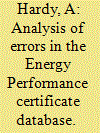

|
|
|
|
|
| Summary/Abstract |
Energy Performance Certificates (EPCs) are the adopted method by which the UK government tracks the progress of its domestic energy efficiency policies. Over 15 million EPCs have been lodged, representing a valuable resource for research into the UK building stock. However, the EPC record has a reputation of containing multiple errors. In this work, we identify many such errors and quantify how common they are. We find that 27% of EPCs in the open EPC record display at least one flag to suggests it is incorrect and estimate the true error rate of the EPC record to be between 36 and 62%. Many of these errors are caused by EPC assessors disagreeing on building parameters such as floor type, wall type and built form. Additionally, flats and maisonettes appear to cause more issues than other property types. This may be due to difficulties in assessing their location in the building and the nature of the surrounding space. We also suggest potential new methods of quality assurance which rely on machine learning and which could allow such errors to be avoided in the future.
|
|
|
|
|
|
|
|
|
|
|
|
|
|
|
|
| 2 |
ID:
150056
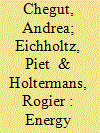

|
|
|
|
|
| Summary/Abstract |
Strong rental protection in the affordable housing market often prohibits landlords from charging rental premiums for energy-efficient dwellings. This may impede (re)development of energy efficient affordable housing. In the Netherlands, affordable housing institutions regularly sell dwellings from their housing stock to individual households. If they can sell energy efficient dwellings at a premium, this may stimulate investments in the environmental performance of homes.
|
|
|
|
|
|
|
|
|
|
|
|
|
|
|
|
| 3 |
ID:
166387
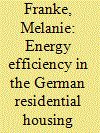

|
|
|
|
|
| Summary/Abstract |
Energy Performance Certificates (EPCs) were introduced by the European Union as a transparency tool in order to meet the targets of reducing the energy consumption of buildings. However, several inefficiencies hindered their implementation, resulting in a recast of the corresponding Directive coming into force in Germany in 2014. In 2012, Amecke (2012) was predicting that a “fundamental change” would occur due to the upcoming improvement of EPCs’ legal status. This follow-up investigation proves Amecke's assumption and expands the examination by comparing different target groups (tenants vs. owners) and elicitation methods (indirect approach via choice-based conjoint analysis vs. direct approach via self-explicated method). We analyzed the survey responses of 206 participants (108 tenants, 98 owners), which had been collected between May and July 2017. The results of the indirect approach suggest an ongoing change in the housing market, as energy efficiency achieves a high importance score similar to that of rent resp. price and of location. Owners are significantly more familiar with the EPC tool, giving it stronger consideration than tenants do. The results indicate three main policy implications concerning enhanced (i) transparency regulation and its compliance, (ii) environmental awareness, and (iii) communication of economic incentives.
|
|
|
|
|
|
|
|
|
|
|
|
|
|
|
|
| 4 |
ID:
109699
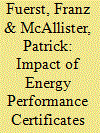

|
|
|
|
|
| Publication |
2011.
|
| Summary/Abstract |
This paper focuses on the effect of energy performance ratings on appraised capital values, rental values and equivalent yields of UK commercial property assets. The study is based on a cross-section of 708 commercial property assets. Incorporating a range of potential confounding factors such as unexpired lease term, vacancy rate and tenant credit risk, we use hedonic regression procedures to estimate the effect of EPC rating on rental and capital values. The study finds no evidence of a significant relationship between environmental and/or energy performance and rental and capital values. A small subset of 24 BREEAM-rated assets is also tested for significant price effects but a statistically significant effect is only confirmed for equivalent yields. Similarly, there was no evidence that the EPC rating had any effect on Market Rent or Market Value with only minor effects of EPC ratings on equivalent yields. The preliminary conclusion is that energy labelling is not yet having the effects on Market Values and Market Rents that would be expected if high EPC ratings were associated with substantial cost savings that are fully reflected in capital values and/or were readily available and taken into account by prospective tenants and buyers.
|
|
|
|
|
|
|
|
|
|
|
|
|
|
|
|
| 5 |
ID:
179714
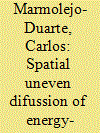

|
|
|
|
|
| Summary/Abstract |
In order to foster energy-informed real estate decisions, the EU has universalised the energy performance certificates to be displayed on advertising for sale and rental. However, in Spain, such certificates are absent in a disturbing proportion of cases. This paper investigates the prevalence of this problem, its spatial patterns, and the concomitant architectonic and locative attributes. In doing so, data from 49,000 apartments listed for leasing and renting in Metropolitan Barcelona are analysed using conventional and spatial econometric methods. The results suggest that the probability that a listing includes the energy rating of the dwelling largely depends on other neighbouring listings. Furthermore, the information opacity exists for the worst dwellings, which are expected to be the most inefficient, located in areas inhabited by low-income population. That is, the population that could benefit the most from this policy is, precisely, the most uninformed.
|
|
|
|
|
|
|
|
|
|
|
|
|
|
|
|
| 6 |
ID:
177105
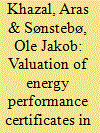

|
|
|
|
|
| Summary/Abstract |
The implementation of Energy Performance Certificates (EPCs) is expected to reduce energy consumption and carbon emissions by providing actors with information that can be used to make better-informed decisions. This paper is the first to investigate EPCs in the Norwegian residential rental market. Applying the hedonic multilevel approach using information from some 440,000 rental contracts over the period of 2011–2018, we find that labeled dwellings have a premium compared with non-labeled dwellings, and that the premium is increasing with a higher EPC-label. We further define two classes of lessors – professional (real estate agents) and nonprofessionals (homeowners) – to study potential heterogeneity in EPC valuation and find that professionals assign higher rents compared with nonprofessionals. Dwellings with high energy efficiency are associated with a higher premium if rented out by a professional, a significant part of which stemming from higher EPC valuation. The results are robust to a number of heterogeneity analyses and after controlling for sample selection bias and unobserved locational heterogeneity. The findings of this paper signify the necessity to increase awareness and public dissemination regarding the EPC policy.
|
|
|
|
|
|
|
|
|
|
|
|
|
|
|
|
|
|
|
|
|